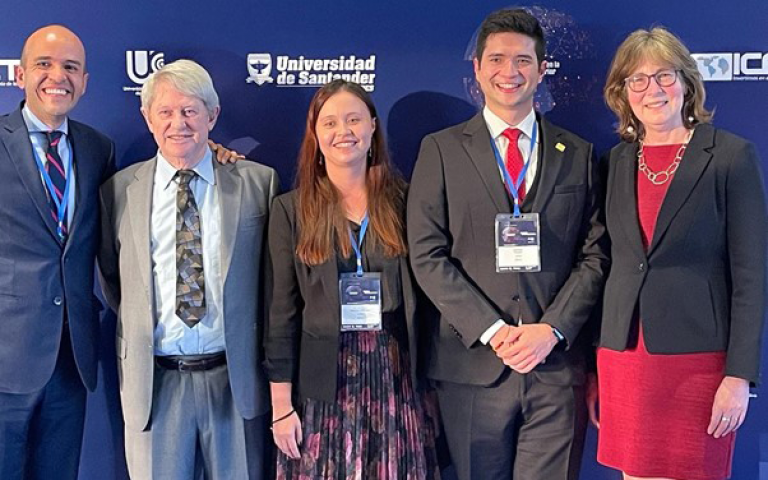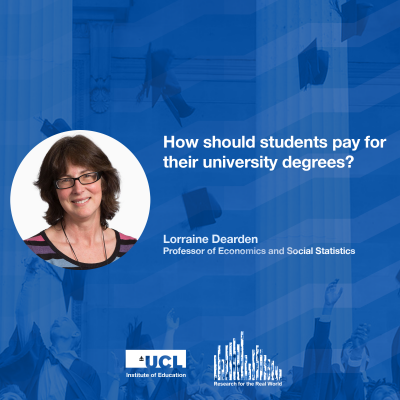Lorraine is Professor of Economics and Social Statistics in IOE's Social Research Institute.
What does your role involve?
All my work involves using data and quantitative techniques to understand, evaluate and inform public policy making. I have a wide range of public policy interests including Higher Education access and financing; returns to education; evaluating school effectiveness; intergenerational mobility; understanding the causes and consequences of child adversity and vulnerability; and evaluating policies that try to help improve child outcomes.
Increasingly my work involves using linked government administrative data to look at important public policy issues in the areas of economics, education and health.
What's the most important thing you've learned from your students about the subject you teach?
I teach and supervise postgraduate students from a large range of disciplines and from a wide range of countries. This has taught me the importance of not being ethnocentric when looking at public policy initiatives and programmes, and to look beyond your discipline when approaching a research topic.
What working achievement or initiative are you most proud of?
I am most proud of the work I have done which has influenced policy making.
I wrote a paper in 1996 advocating a conditional cash transfer (CCT) paid directly to poor students to encourage them to stay in school based on a similar successful scheme in Australia (which I evaluated in the same paper). After initial resistance, there was a pilot of such a scheme in 1999 - the Educational Maintenance Allowances (EMA). Our evaluation of this pilot showed that it was effective in reducing school drop-out rates, particularly for boys and as a result the EMA was rolled out nationally in 2004. All subsequent evaluations suggested it had a positive impact on reducing school drop-out rates and was a cost-effective policy in the long run. Despite this evidence, it was axed in England in 2011, although it does still operate in Wales and Scotland.
My work with a number of colleagues on Higher Education (HE) funding issues over the last 25 years has influenced HE funding design in England and increasingly around the world. Student loan systems are in crisis in a number of countries with many students struggling to pay and defaulting on their student loans. This has dire consequences for students and has become worse since COVID-19. This is because in most countries’ student loans have to be repaid, regardless of whether a person is able to afford such payment. This is not the case in the UK, Australia and New Zealand where there are income-contingent loans.
I have been working closely with officials and academics in many countries to help them design and introduce income-contingent student loans. Countries I have worked with include Japan, Brazil, the US, Malaysia and Colombia.

I am particularly proud to say that after 6 years of collaboration with Colombian officials, they have introduced a new income-contingent student loan for students from 2022. I was invited to Colombia to see the final regulations signed in April 2022. This will change the lives of Colombian higher education students going forward, particularly those from the most vulnerable backgrounds.
“My basic lesson from all my work is not to give up, keep an open mind, and to use ever improving large scale micro level data to see how public policy making can be made better."
What would it surprise people to know about you?
I am a big cricket fan. I use to play both indoor and outdoor cricket when I lived in Australia and all four of my sons share this passion with me. I am also an improving, though still quite mediocre, Bridge player.
What other piece of research outside of your own subject area interests you?
I am very interested in epidemiology and I am increasingly involved in work that involves close collaborations with epidemiologists which I think will help improve health, education and economic policy making.
I am currently involved in the UCL-led HOPE (Health Outcomes of young People throughout Education) study which will look at the impact of special educational needs provision on health and education outcomes, particularly for children with profound health issues.
As an economist, it is clear that focusing on purely education and/or economic outcomes tells you only part of the impact of economic/education policy making. Equally, with a lot of clinical based practices, the important outcomes in judging the effectiveness of a clinical intervention are not only health outcomes, but for example, whether people can actively re-engage in education and/or the labour market after a serious illness or if they have profound health issues.
Image (above): Courtesy of Universidad de Santander.
 Close
Close



